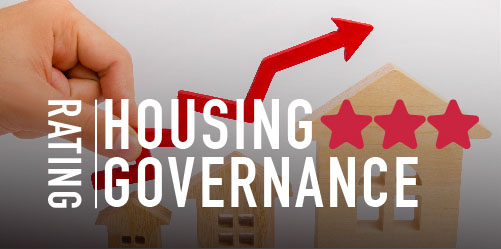Good governance is the key to a successful Housing Association. This is why the Regulator of Social Housing created a grading system for Governance on a scale of 1-4, 1 being the best and 4 being the worst.
Essentially this is what each grading means:
G1: You meet their governance requirements.
G2: You meet their governance requirements but need to improve some aspects of your governance arrangements to support continued compliance.
G3: You do not meet their governance requirements. There are issues of serious regulatory concern and in agreement with them you are working to improve your position.
G4: You do not meet their governance requirements. There are issues of serious regulatory concern and you are subject to regulatory intervention or enforcement action.
So what exactly are their governance requirements?
Housing Governance Requirements:
The governance requirements come down to two things: the regulations and the protocol expected to follow the regulations.
Firstly, the regulations:
Governance arrangements shall ensure registered providers:
(a) adhere to all relevant law
(b) comply with their governing documents and all regulatory requirements
(c) are accountable to tenants, the regulator and relevant stakeholders
(d) safeguard taxpayers’ interests and the reputation of the sector
(e) have an effective risk management and internal controls assurance framework
(f) protect social housing assets
Secondly, the protocol expected:
- Have an appropriate skills strategy to address the needs of the business.
- Regularly assess whether Boards and management have the right competencies, experience, and technical knowledge appropriate to the size, scale and risk profile of the organisation.
- Ensure all material decisions are made with appropriate internal/external expertise or advice and should satisfy themselves of the impartiality of any support or advice.
- Have plans to address any skills gaps identified (including through bringing in external skills), and such plans should be monitored to ensure that they are followed through.
Simple Steps to improve your grading:
You should create subcommittees to deal with the 4 aspects of governance the Regulator of Social Housing wants you to focus on. These are:
- Audit and Risk
- Development
- Nominations and Remuneration
- Operations
These subcommittees should include an Executive Director to oversee and report back to the Board.
You should also ensure you have a clear code of governance. This is essential for compliance and should always be observed. If you want to improve your internal processes, we have written an outline for what constitutes good governance.
What should each subcommittee do?
1. Audit and Risk Committee
An Audit and Risk Committee should regularly review the code of governance and practices of the organisation to ensure compliance. They are also responsible for ensuring the integrity of the financial statements. They also produce risk assessments for the Board.
Essentially they hold the Board responsible for accuracy and compliance. They are the internal auditors. So, they should be aware of any national or international developments in regulatory judgements that will impact the organisation.
2. Development Committee
The Development Committee should focus on identifying where the Board and individual Directors need training and development. They are responsible for guaranteeing that everyone is aware of their roles and responsibilities and have the tools to succeed.
They are also in charge of ensuring that the Board includes a diversity of opinions and persons. The housing sector is focused on increasing Board diversity, which will improve your organisation.
3. Nominations and Remuneration Committee
The Nominations and Remunerations Committee determines the pay, benefits and compensation Packages of each Executive Director, including the Chief Executive Officer. It is essential that this is a transparent protocol. They can also make recommendations for the salaries of non-Executive Directors. All of this must be presented to the Board for consideration.
The Committee is also responsible for setting the Human Resources strategy for the company. This means ensuring any compensation packages for any justified or unjustified dismissals are clear and fair.
4. Operations Committee
The Operations Committee reviews and oversees all the ongoing activities of an organisation. They will suggest business strategies and potential issues within the operations of the company: this can include within the supply chains, goods or services, operations functions or operations management.
They are also focused on the economic growth of the organisation. This means internally auditing any financial statements, as well as creating targets.
How can Convene help you improve your Grading?
Convene is a Board Portal solution with features that will help you with audit trails, accessibility and streamlining your processes. Every committee meeting will be more effective with Convene.
Organising a meeting and creating a Board Pack can be done in a few simple clicks and updated up until the last minute. Furthermore, an agenda is automatically generated saving your administrative staff any hassle!
During the meeting you can follow along with the speaker, turn attention to specific lines with our exclusive laser pointer function, and make shared or public annotations. To further streamline processes, you can include Action Items which can be followed up in or out of committee meetings.
Our Meeting Minutes and Document Library make any internal audit simple. Board Papers will be easily accessible to review whenever and wherever. With role-based access controls, you can be sure that your files are secure from prying eyes.
Our security is the best available. We are compliant with ISO27001, as well as being CMMI Level-5 certified, which is a requirement to work with NASA.
If you would like to learn more please do not hesitate to contact us or book a free demo!








